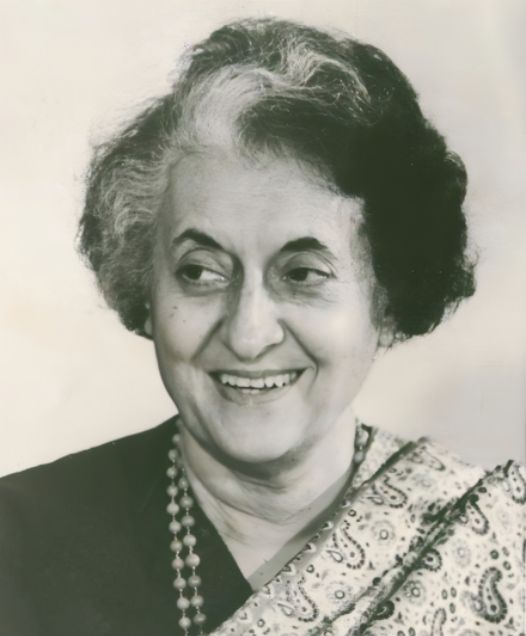Indira Nehru Gandhi’s life mirrors the divided country she governed as the first woman Prime Minister of India. She inherited a political consciousness from her nationalist grandfather Motilal Nehru and her father, India’s first Prime Minister, Jawaharlal Nehru. The Nehrus are sometimes called India’s royal dynasty, but this is a contradiction of the very ideals the Nehru family and the peaceful revolutionary Mohandas K. Gandhi believed in as they worked to end England’s colonial rule over India.
As a girl, Indira witnessed up close the birth of modern, independent India under the leadership of Gandhi and her relatives. The Nehrus were a wealthy family who were moved by meeting Mohandas in 1919 to give up all their possessions and join in the struggle for independence. Indira endured the frequent jailings of Jawaharlal (and later, her mother) for nationalist activities. The young girl’s role model was Joan of Arc; later she told of playing with dolls to whom she assigned patriotic roles in the fight to free India from their foreign rulers. Indira’s childhood was unusual, by any means, often accompanying her father in his travels and meeting luminaries such as Albert Einstein and Ernst Toller. Indira also organized The Monkey Brigade for preteen revolutionaries and was later beaten cruelly for marching carrying India’s flag. She and her family often visited Gandhi, who was “always present in my life; he played an enormous role in my development.”
Indira suffered depression, anxiety, and illness from her unsettled life, and at age twenty-two married Feroze Gandhi, a family friend who was a Parsee, a member of a small religious sect, and not considered appropriate for Indira, who was of the Brahmin, or priestly, caste. Arrested for their nationalist activities, both Indira and Feroze spent nine months in jail, which, Indira claimed, was the most important event of her life, strengthening her political resolve.
Upon the deaths of their great leader Gandhi and the continued bloodshed during the Partition dividing India into Hindu India and the new Muslim state of Pakistan, Indira joined India’s Congress party and began to forge her own political sensibility. When India gained independence in 1947, her father became Prime Minister; because he was a widower, he needed Indira to act as his official hostess. During the time of her father’s multiple strokes, Indira was tacitly acting as Prime Minister. Upon his death in 1964, Indira became president of the India National Congress. After her father’s successor Lal Bahdur Shastri’s brief ministry and death from heart failure, Indira won the election by a landslide and became the leader of the world’s largest democracy, a leader of a country where women’s rights were not a top priority. Immediately she became a role model for millions of India’s women, traditionally subservient to men.
Indira inherited a land where starvation, civil wars, severe inflation, and religious revolts were a daily reality. She constantly endangered her health by working sixteen hour days trying to meet the needs of the second most populated country on earth. Her political fortunes rose and fell; she was booted out of office in 1977, only to be reelected a few years later to her fourth term as prime minister. Her controversial birth-control program is overlooked oftentimes in the criticisms that she traded political favors in order to hang onto the ministry.
Indira was constantly caught in between the warring factions and divisions of India’s various provinces and interests, and the history of her ministry reads like a veritable laundry list of riots, uprisings, and revolutions all played out on partisan quicksand. Her assassination demonstrates this fully. In 1919, British troops had massacred thousands of Sikhs, a proud warrior caste, in their sacred place of worship—the Golden Temple of Amritsar Sixty-five years later, Amritsar again ran red with the blood of Sikh extremists attempting to create a stronghold in which to make their demand for greater autonomy. When the Indian army invaded and seized back the temple, the sparks of anger blazed out of control. Across India, Sikhs were cursing the name of Ghandi, including some of her personal security guards. Four months later, Indira was shot to death by a Sikh in her garden, where she was about to be interviewed by Peter Ustinov. Her son, Rajiv, became the next Prime Minister and met an equally violent end when a Sri Lankan Tamil woman leapt onto him and detonated a bomb she had strapped to herself.
Indira Gandhi’s life is difficult to fully comprehend without a grasp of Indian history. Perhaps the deepest understanding of her comes through consideration of her chosen role model, Joan of Arc, a model for self-sacrifice who places the interests of her country above the value of her own life, and as a woman warrior in a battle of religious politics pitting men against men. Indira Gandhi’s own insistence to reporters who wanted to talk about her uniqueness as a woman Prime Minister speaks volumes as well: “I am not a woman. I am a human being.”
This excerpt is from The Book of Awesome Women by Becca Anderson which is available now through Amazon and Mango Media








